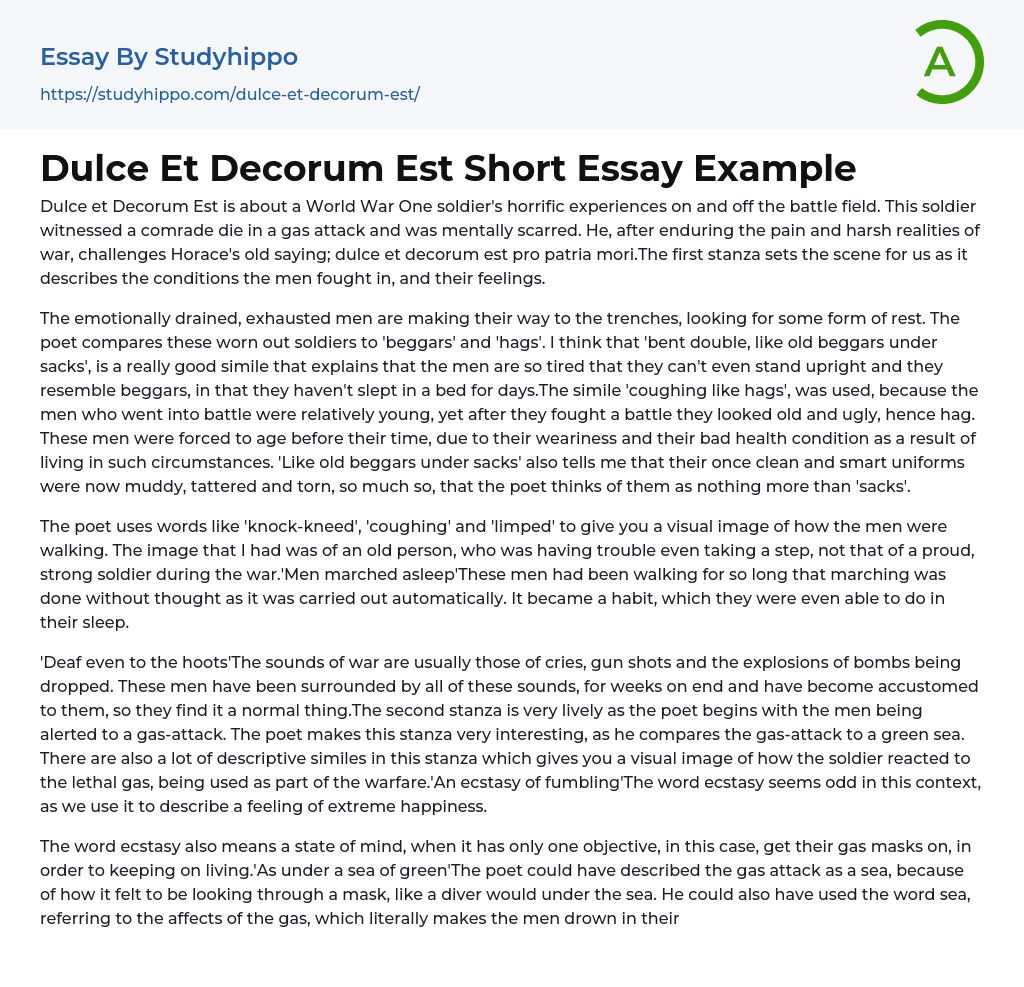The poem Dulce et Decorum Est depicts the harrowing experiences of a soldier during World War One, both in battle and outside it. The soldier personally witnessed the death of a comrade due to a gas attack, leaving him with lasting mental trauma. Having gone through the agony and brutal truths of war, he questions the validity of Horace's famous quote: "dulce et decorum est pro patria mori". The opening stanza provides a vivid portrayal of the soldiers' environment and emotions as they fought.
The soldiers, who are emotionally drained and exhausted, are heading to the trenches in search of rest. In this state, they are compared to 'beggars' and 'hags' by the poet. The simile 'bent double, like old beggars under sacks' effectively conveys the soldiers' extreme fatigue and their resemblance to beggars who have not slept in a proper bed for days
.... Similarly, the simile 'coughing like hags' highlights how these young soldiers have been aged and made ugly by the toll of battle and poor living conditions. Through the use of these comparisons, the poet evokes sympathy for these soldiers who have been forced to endure physical hardships far beyond their years. The mention of their uniform being 'muddy, tattered and torn' reinforces this picture of soldiers who have been reduced to little more than sacks themselves.
The poet utilizes descriptive language such as 'knock-kneed', 'coughing', and 'limped' to convey a physical portrayal of the soldiers' movements. This description portrays a frail and struggling individual rather than a prideful, powerful warrior. 'Men marched asleep' emphasizes that the act of marching became reflexive and routine due to the extensive duration of their journey, even
to the point where it could be performed unconsciously during slumber.
The sounds of war, such as cries, gunshots, and bombs exploding, are typically heard by soldiers. After being surrounded by these sounds for weeks, the soldiers have become accustomed to them. The second stanza is livelier, with the poet describing a gas attack. The poet compares the attack to a green sea and uses similes to describe how the soldier reacted to the deadly gas. The word "ecstasy" seems out of place in this context since it typically describes extreme happiness.
In this context, the term ecstasy refers to a singular state of mind - to don gas masks as a means of survival. The poet describes the gas attack as being reminiscent of being underwater and looking through a mask, much like a diver would. He could have also referred to the effects of the gas as akin to drowning in a sea of blood. The third stanza serves to illustrate the poet's recurring nightmares about the incident, providing graphic details of how the soldier slowly succumbs to his death.
'Guttering, choking, drowning' exemplifies consonance and effectively conveys a sense of present, ongoing suffering that is akin to dying. Each word represents a different way of dying, thereby emphasizing the extent of the man's suffering who failed to secure his mask in time. Stanza four echoes a violent tone, presenting readers with the harsh reality of war and fighting, which I find quite unsettling as it prompts vivid imagery of the scenarios presented by the poet.
According to me, the poet's authenticity in experiencing the war is the worst aspect of it. The use of
the word "flung" indicates that there were excessive corpses and they were not taken care of appropriately. Additionally, it implies that soldiers died without any dignity as they struggled to wear their gas masks on time. The phrase "white eyes writhing in his face" portrays a vivid picture of the soldier's agony as his eyes still moved while dying.
'His face hung like a devil sick of sin'; this descriptive simile compares the chlorine-affected soldier's face to that of the devil, conveying the poet's disgust. The use of 'innocent' suggests the soldiers were young and forced into the war, indicating a sense of pity. Although difficult to understand at first, after re-reading, the depth of the phrases and similes became apparent. The poem's ability to evoke imagery made it enjoyable. Ironically, those who have not experienced war believe the saying 'It is sweet and glorious to die for one's country,' but to those who have, it is far from true.
It's odd that the soldiers in this poem are portrayed as weak, tired, and decrepit instead of the typical strong, proud, heroic, loyal, and brave stereotype we're used to.
- Aeneid essays
- Beowulf essays
- Blackberry Picking essays
- Canterbury Tales essays
- Dulce Et Decorum Est essays
- My Last Duchess essays
- Odyssey essays
- Sir Gawain And The Green Knight essays
- The Road essays
- Ambition essays
- Anger essays
- Betrayal essays
- Boredom essays
- Confidence essays
- Courage essays
- Desire essays
- Disgrace essays
- Doubt essays
- Empathy essays
- Fairness essays
- Fear essays
- Feeling essays
- Forgiveness essays
- Grief essays
- Guilt essays
- Happiness essays
- Harmony essays
- Hate essays
- Honesty essays
- Honor essays
- Hope essays
- Humanity essays
- Inspiration essays
- Kindness essays
- Laughter essays
- Loneliness essays
- Lost essays
- Loyalty essays
- Need essays
- Passion essays
- Pressure essays
- Pride essays
- Regret essays
- Respect essays
- Responsibility essays
- Sarcasm essays
- Shame essays
- Suffering essays
- Suspense essays
- Tolerance essays




